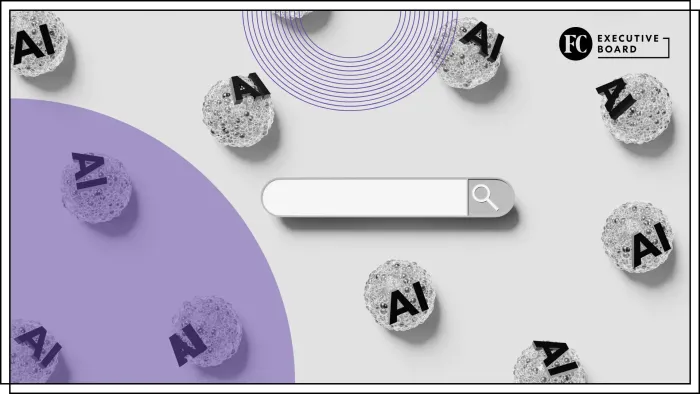
.
Image: Getty Images
AI isn’t just reshaping your web traffic; it’s redefining how buyers discover and evaluate solutions. While companies debate hero copy and pricing-page design, buyers have already moved upstream. AI meets them earlier, answering questions before they even click on your site. The real opportunity isn’t in clawing back lost traffic; it’s in showing up earlier, more often, and in smarter places.
Here are three reasons your website is becoming irrelevant:
Let’s break this down.
Google’s AI Overviews (formerly known as Search Generative Experience) are rolling out to more users and surfacing stronger answers. Nearly 60% of searchers in the U.S. were served AI-generated answers at the top of results pages, according to a 2025 Pew Research Center report. For many queries, users now get the summary and the source without needing to click.
One marketer watched blog traffic drop from 2,400 to under 800 daily clicks with the same impression volume. Why? Google summarized the answer, credited the source, and moved on. This isn’t rare anymore. Recent SparkToro data concurs, suggesting that zero-click searches account for nearly 58.5% of searches in the U.S.
This doesn’t mean the end of visibility. It means your first impression will happen outside your website. Spoiler: That’s always been the case, you just couldn’t track it.
Organic search still drives billions of blog visits a day. But the distribution has shifted. Brands with strong forums, multimedia content, or external reputation signals are gaining share. Traditional blog content? It’s still useful, but it can’t be your only play.
This is the moment to rethink what search visibility really means.
If you’re looking for an AI-friendly SEO strategy, here are six steps to take.
1. You can’t fix what you don’t measure. Google Search Console now breaks out AI Overview impressions and clicks. Use it. Find out which queries are triggering AI blurbs, and which pages are losing the most traffic by tracking:
New rule: Your content must answer the question before it is asked. The best-performing AI-overview-scraped content has a clear structure, expert sourcing, and direct language.
Think: Situation > Complication > Question > Answerin 300 words or less.
Statistically, pages with structured data are 40% more likely to be pulled into AI Overviews. Don’t skip it.
To stay relevant in an AI-first world, marketers must protect what’s working, pivot what’s not, and actively promote content across the channels where AI (and buyers) are paying attention.
Protect: Audit your top revenue-driving URLs. If they’re losing traffic to AI, rebuild them with tighter value props and more original insights.
Pivot: Rework generic posts into first-person or expert-style pieces. Think contributor tone, not corporate brochure.
Promote: AI isn’t going to push your post. You have to push it through email, social media, repurposed into video, and syndicate.
GPT-style models source from Reddit, Quora, G2, TrustRadius, analyst blogs, and even YouTube comments. If your brand isn’t part of those conversations, AI assumes you don’t exist.
Here’s the kicker: experts are saying that buyers are using AI tools to pre-screen vendors and validate their claims before they even speak to sales. If you haven’t explained pricing clearly, Reddit will.
YouTube links are showing up directly in Google’s AI overviews. Google’s even testing video-first carousels for B2B queries. TikTok continues to rise as a search engine for Gen Z, with 39% of adults under 30 even saying they get their news from the platform. The point? If you’re not creating explainer videos, walkthroughs, or thought-leader clips, you’re handing traffic to the next brand that is.
When buyers ask AI, “What’s the easiest CRM for a small agency?” AI’s answer is shaped by reviews, forums, Reddit threads, pricing pages, and blog posts. If your voice isn’t in that mix, you’re not even a candidate. Buyers are turning to AI not web search.
You’re not writing content for humans alone. You’re feeding the machine that feeds the humans.
That’s the gig now. It’s time to start making changes or risk becoming the next GeoCities page the robots ignore.
ABOUT THE AUTHOR
Andrea Lechner-Becker is the Chief Strategy Officer at GNW Consulting. Read Andrea’s Executive Profile here.
FAST COMPANY
